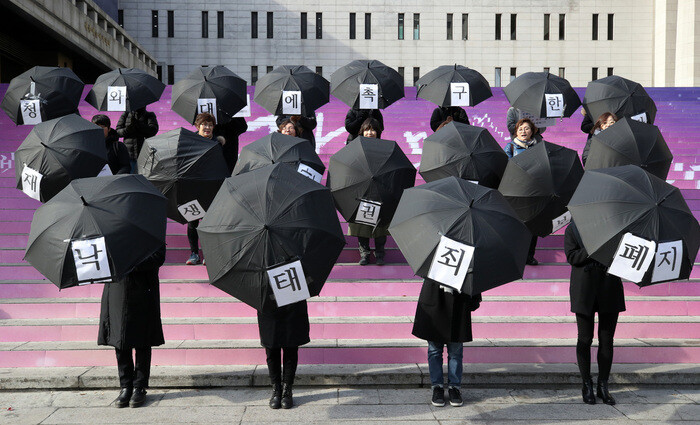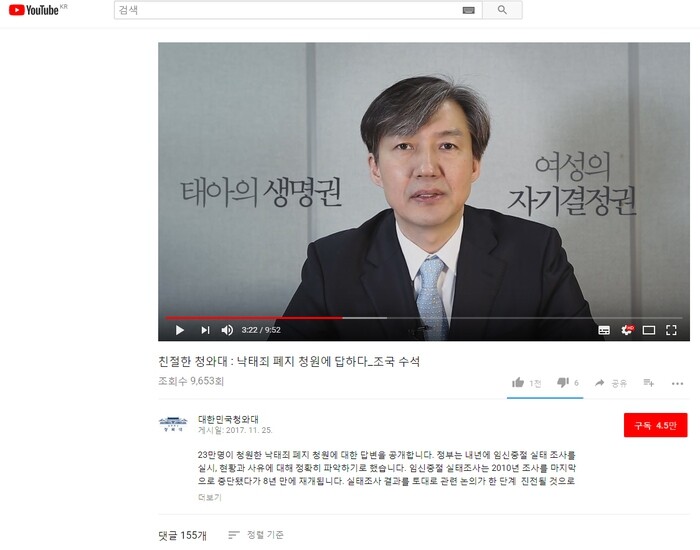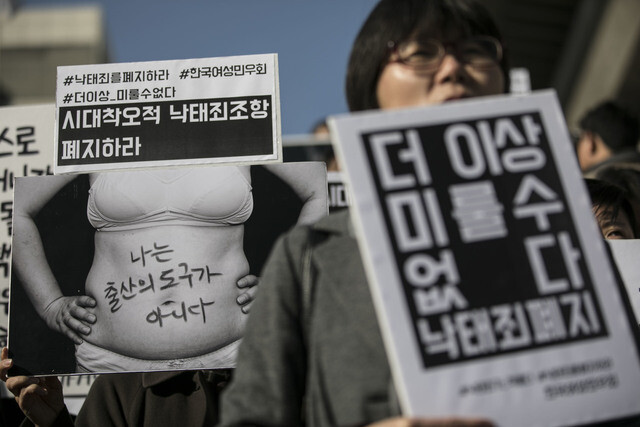hankyoreh
Links to other country sites 다른 나라 사이트 링크
Blue House responds to petition for abortion rights with launch of fact-finding study

On Nov. 26, the Blue House announced that it would be carrying out a fact-finding study on abortion next year in response to the controversy about its criminal status in South Korea. With the country’s Constitutional Court reviewing the section of the criminal code imposing penalties for abortion once again this year after upholding its constitutionality in 2012, the Blue House is taking steps to launch a public debate on the abortion ban aimed at greatly relaxing it or ending it altogether.
In a video response to a petition to decriminalize abortion on the Blue House website that attracted more than 235,000 signatures, Blue House Secretary for Civil Affairs Cho Kuk said, “We will carry out a fact-finding study of abortion next year to accurately determine the status of abortion today and the reasons for the ban. We expect that the results of that study will help the related discussion move to the next level.” A fact-finding study on abortion had been carried out at five-year intervals by the Ministry of Health and Welfare, but no study has been conducted since 2010.

“While the fetus’s right to life is very precious, a policy focused on tougher punishment has continued to cause side effects such as driving the abortion industry underground, multiplying illegal operations, making the operation more expensive and pushing people to get dangerous procedures or even to travel overseas,” Cho said.
“The current legal regime places all the responsibility on the woman while completely disregarding the man’s responsibility. In addition to the woman’s right to choose, we should also be discussing the possibility of the woman’s right to life and right to health being infringed by illegal abortion procedures.”
“We hope that this matter will be pondered by the legislative branch, which is responsible for revising the law,” Cho said, noting that it was already being discussed at the Constitutional Court. He also said that the question of legalizing Mifegyne (mifepristone), a drug that can induce abortions, would be “decided according to the results of the social and legal discussion.” Other measures that Cho said the government would be taking to address abortion include systematizing birth control education for teenagers, providing more concrete socio-economic support for single mothers and promoting a culture of adoption.
The reason that the Blue House has agreed for the government to conduct a fact-finding study of abortion next year, eight years after the previous study, is because the intensity of the debate over legalizing abortion. Since the Blue House does not have the authority to make laws, it appears to have settled on the course of using a fact-finding study to shift public opinion in support of decriminalizing abortion. Abortion is defined as a crime by Article 269, Clause 1, of South Korea’s criminal code, which states that a pregnant woman who causes an abortion by taking medication or through another means is subject to up to a year in prison or up to a fine of 2 million won (US$1,837).

Cho stressed taking a cautious approach: “As long as we insist that people choose between the fetus’s right to life and the woman’s right to choose, we won’t be able to make progress on this debate. Both of those are precious values that must be defended by our society.” Even so, the data and examples that Cho cited suggest that the Blue House is leaning toward greatly easing the ban on abortion or abolishing it altogether. “In order to discuss this issue, we first need to consider how many abortions are occurring and what the causes are,” Cho said, mentioning data from the government’s 2010 study.
That study estimated that more than 169,000 abortions were taking place every year, but that only 18,000 of these procedures, or 6%, were legal. Barely 10 people faced charges for illegal abortions each year. Cho also brought up the fact that 29 of the 35 OECD member states, or 80%, allow abortion.
“Currently, abortion is a crime even under these three circumstances,” Cho said, referring to women who learn about their pregnancy after breaking up with the man they were dating, women who find out they are pregnant with the child of a husband with whom they are separated or with whom they are engaged in divorce proceedings, and women who get pregnant while they are completely unable to raise a child because of financial difficulties resulting from unemployment or illness.
“Just as Pope Francis has said that we need to find a ‘new balance’ on abortion, we hope that this petition will be an opportunity for our society to also find a new balance,” Cho said. “We were planning to carry out a fact-finding study on abortion every five years, but we were unable to do so in 2015 because no funding was earmarked for that in the budget. The government’s budget bill for next year allocates 200 million won (US$183,700) for a study,” said an official from the Ministry of Health and Welfare.
At the moment, South Korea bans all abortions, only making exceptions for incest, sexual assault and cases in which the health of the mother is in jeopardy. In 2012, the Constitutional Court upheld the constitutionality of the ban on abortion in the criminal code due to a split 4-4 decision, which kept the existing law intact. “Since the fetus itself is a separate living being from the mother and is very likely to grow into a human being, its right to life must be recognized,” the court said at the time.
This past February, another petition was filed with the Constitutional Court to review the ban on abortion. The mood is quite different from five years ago. All eight of the justices who took part in the previous constitutional review have already left the court. During the confirmation hearing at the National Assembly, Constitutional Court President Hon. Lee Jin-sung (who takes office on Nov. 27) said that “one possible option would be to permit abortion for a certain period of time [after pregnancy].”
“There are exceptional cases early in an undesired pregnancy when it is necessary to prioritize the woman’s right to choose,” said Hon. Kim Yi-su, another judge on the court, who argued that the ban on abortion should be adjusted. Three other justices – Hon. Kang Il-won, Hon. Ahn Chang-ho and Hon. Kim Chang-jong – have also opined that “protecting the life of the fetus and the woman’s right to choose must be harmonized.”
By Seong Yeon-cheol, Kim Min-kyung, and Kim Yang-joong, staff reporters
Please direct questions or comments to [english@hani.co.kr]

Editorial・opinion
![[Column] Has Korea, too, crossed the Rubicon on China? [Column] Has Korea, too, crossed the Rubicon on China?](https://flexible.img.hani.co.kr/flexible/normal/500/300/imgdb/original/2024/0419/9317135153409185.jpg) [Column] Has Korea, too, crossed the Rubicon on China?
[Column] Has Korea, too, crossed the Rubicon on China?![[Correspondent’s column] In Japan’s alliance with US, echoes of its past alliances with UK [Correspondent’s column] In Japan’s alliance with US, echoes of its past alliances with UK](https://flexible.img.hani.co.kr/flexible/normal/500/300/imgdb/original/2024/0419/2317135166563519.jpg) [Correspondent’s column] In Japan’s alliance with US, echoes of its past alliances with UK
[Correspondent’s column] In Japan’s alliance with US, echoes of its past alliances with UK- [Editorial] Does Yoon think the Korean public is wrong?
- [Editorial] As it bolsters its alliance with US, Japan must be accountable for past
- [Guest essay] Amending the Constitution is Yoon’s key to leaving office in public’s good graces
- [Editorial] 10 years on, lessons of Sewol tragedy must never be forgotten
- [Column] A death blow to Korea’s prosecutor politics
- [Correspondent’s column] The US and the end of Japanese pacifism
- [Guest essay] How Korea turned its trainee doctors into monsters
- [Guest essay] As someone who helped forge Seoul-Moscow ties, their status today troubles me
Most viewed articles
- 1[Column] The clock is ticking for Korea’s first lady
- 2[Column] Has Korea, too, crossed the Rubicon on China?
- 3After 2 months of delayed, denied medical care, Koreans worry worst may be yet to come
- 4US overtakes China as Korea’s top export market, prompting trade sanction jitters
- 5[Editorial] When the choice is kids or career, Korea will never overcome birth rate woes
- 6[Correspondent’s column] In Japan’s alliance with US, echoes of its past alliances with UK
- 7Hong Se-hwa, voice for tolerance whose memoir of exile touched a chord, dies at 76
- 8Nearly 1 in 5 N. Korean defectors say they regret coming to S. Korea
- 9John Linton, descendant of US missionaries and naturalized Korean citizen, to lead PPP’s reform effo
- 10Strong dollar isn’t all that’s pushing won exchange rate into to 1,400 range